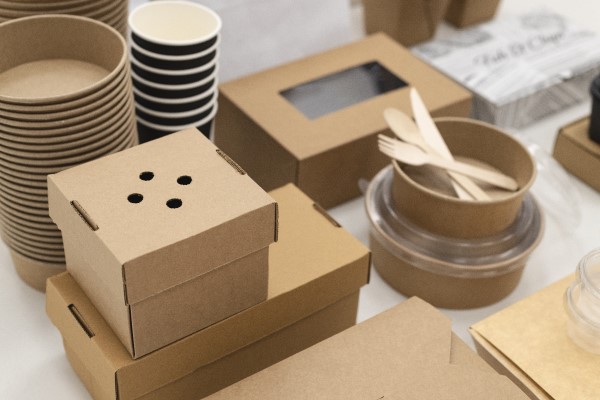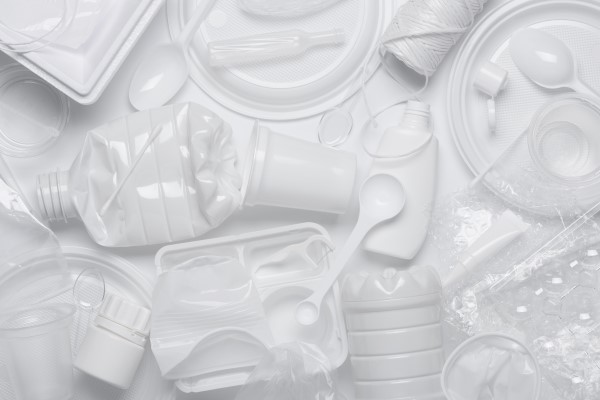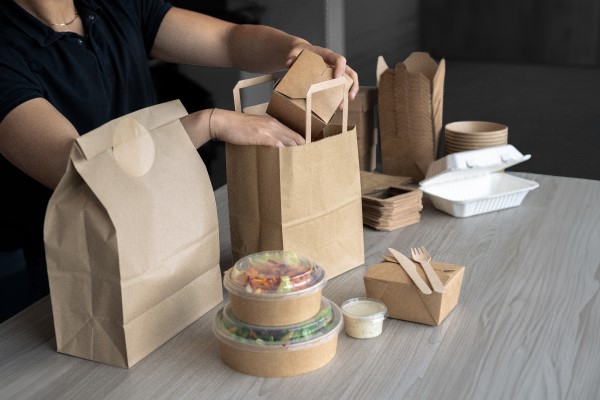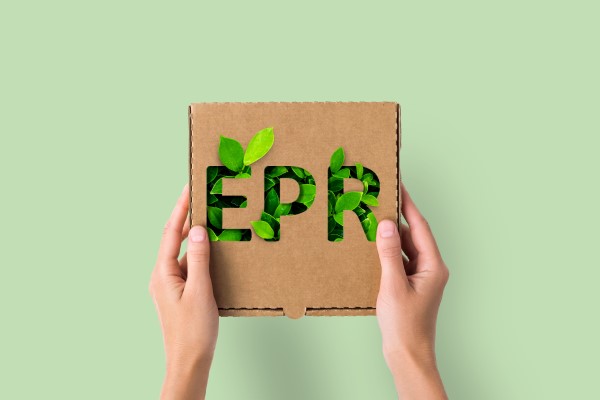Kite blog
Food Packaging Challenges: Addressing Plastic Pollution, the Single-Use Plastics Ban, and Extended Producer Responsibility
The world has become heavily dependent on plastics due to their low production costs, durability and remarkable versatility. This reliance permeates almost every aspect of modern life, from consumer goods to industrial applications. Wherever you look, plastics can be found shaping our daily routines, encasing our food, facilitating our transport, and even intertwining with our clothing fibres.
However, despite many applications, vast amounts of plastic products are often discarded after just one use, making plastic waste a major environmental concern globally.
Humans produce more than 350 million metric tons of plastic waste per year, a figure which is expected to triple by 2060 if policies for plastic production, consumption and management do not change.
Plastic Pollution In the UK
At a time when environmental consciousness is paramount, it is worrying to note that UK households throw away 100 billion pieces of plastic packaging a year – a figure which is likely higher in reality. Food and drink packaging accounts for 83% of this waste.
This alarming statistic casts a spotlight on the critical role that sustainable food packaging solutions are to play in addressing growing environmental challenges.
Policy measures like the Single-Use Plastics Ban and Extended Producer Responsibility schemes will be key in driving substantive change – compelling vendors to use sustainable alternatives and holding producers responsible for their products’ lifecycles.
Before looking at these new policies, let’s take a look at what food and drink packaging is defined as and why it makes up such an overwhelming majority of our plastic waste.
What is Food and Drink Packaging?

Food and drink packaging is defined as any material or container used to protect, preserve and present food and drink products from the point of manufacture to the end consumer. It uses a wide range of materials, such as cardboard, plastic, glass, metal and paper, as well as various forms and designs tailored to specific products and purposes.
Beyond these primary functions, food packaging also facilitates transport, communicates important information about the product and acts as a marketing tool to enhance product appeal.
Why Does Food and Beverage Packaging Contribute So Heavily to Plastic Waste?
There are several reasons for this:
The Rise of Food Delivery Services
The UK's takeaway and fast-food industry has undergone a significant transformation in the past few decades. From offering just a few options, it has evolved into a sophisticated sector that satisfies a wide spectrum of tastes and preferences. And it continues to expand.
The Online Food Delivery market is currently expected to grow by 5.59% annually from 2024-29. This is being driven by busy lifestyles and a preference for quick and easy meal solutions. Covid-19 also played its part with lockdowns and social distancing measures which made food delivery services a go-to for safe and convenient dining options.
But, as expected, this has led to a concerning increase in packaging waste. That's where the single-use plastics ban comes into play.
Food and Drink Packaging at Festivals

Another major contributor to the UK’s plastic waste crisis are music festivals. These vibrant social gatherings bring people together to celebrate music and enjoy food and drink, but often leave a trail of waste behind.
Despite increasing awareness about plastic pollution, festivals continue to rely heavily on single-use plastics because they are lightweight and cheap. This makes them much more attractive to event organisers and vendors, especially when compared to sustainable alternatives, which can often cost three times as much.
In the UK in 2022 alone, 6.5 million music fans descended upon festivals, so it comes as no surprise that festival goers generate approximately 1.3 million food containers in waste every year. Add to this figure another 2 million discarded plastic bottles for which festivals are notoriously known, and the image painted is one of environmental strain and waste.
Many festivals are now embracing sustainability initiatives, aiming to blend the celebration of music with responsible stewardship of our environment. Event organisers are reducing plastic waste by promoting reusable containers, encouraging attendees to bring their own water bottles, and implementing recycling programmes.
Glastonbury, for instance, known for its strong environmental stance, banned the sale of single-use plastic bottles in 2019. The festival now encourages the use of reusable water bottles and provides numerous water refill stations to reduce the volume of waste produced and many others have followed suit.
Single-Use Plastics Ban

Research reveals that people in England use approximately 2.7 billion pieces of single-use plastic cutlery and 721 million single-use plates annually. Sadly, only 10% of these items are recycled. To visualise the scale, if we lined up 2.7 billion pieces of cutlery, they would go around the world more than eight and a half times.
That's why, effective from 1st October 2023, England implemented a ban on several single-use plastic items with the aim of reducing plastic waste and its detrimental impact on the environment.
This ban includes polystyrene food and drinks containers. Commonly used for takeaways and fast food, these non-biodegradable containers wreak havoc in the environment once disposed and are no longer allowed for online or over-the-counter sales. Cutlery, drink stirrers and balloon sticks are amongst other items that are banned.
The new regulations also impose restrictions on the use of plates, bowls, and trays. While these items are restricted, businesses can still supply them if they are used as packaging, pre-filled, or filled at the point of sale. For instance, pre-filled salad bowls or ready meals packaged in trays fall under this exemption.
However, the ban does not apply to plates, trays, and bowls used as packaging for shelf-ready pre-packaged food items. These items will be addressed through the government’s Extended Producer Responsibility (EPR) plan. There are also exemptions for medical devices and uses, care homes, schools, and other specific contexts where single-use plastic straws and cotton buds are necessary.
By implementing this ban, England encourages more sustainable practices which work to reduce the volume of plastic waste in order to protect the environment.
Wales introduced its own ban from 30th October 2023, while similar prohibitions already existed in Northern Ireland and Scotland.
Sustainable Swaps: Kite’s Eco-Friendly Packaging Alternatives

As the UK takes bold steps toward reducing plastic waste, businesses are actively seeking sustainable alternatives to replace banned or restricted items. As a carbon neutral company, we are committed to offering eco-friendly food and drink packaging solutions that align with the new regulations and are often the packaging supplier of choice for many businesses.
Food Containers & Trays
Kite’s takeaway boxes are made from kraft paper, which is 100% recyclable, biodegradable, and commercially compostable. Unlike polystyrene, which is harmful to the environment, these boxes contribute to responsible disposal while accommodating a variety of cuisines, from burgers to fish and chips. We also supply burger boxes made from bagasse, a by-product of harvesting sugarcane juice. Bagasse breaks down into nutrient-rich compost and is rapidly renewable, making it the perfect replacement for plastic or polystyrene burger containers.
Coffee Cups
Our coffee cups are crafted from 100% recyclable virgin food-grade double-walled paper, reducing their environmental impact. The accompanying lids, made from virgin food-grade PS plastic, prioritise food safety and can also be recycled.
Whether you’re selling a delicious latte or a steaming americano, these paper cups come in multiple sizes, catering to various drink volumes.
Wooden Cutlery
Made from birch wood, our wooden cutlery is 100% commercially compostable and environmentally friendly. Unlike plastic cutlery, which lingers in landfills, this wooden alternative doesn’t contribute to pollution. It’s cost-effective for takeaway businesses without compromising quality. It pairs well with main meals, sides, desserts, and even hot drinks.
Alternatives for Plates
If you're looking for an eco-friendly alternative, our takeaway boxes are a convenient replacement for plates. Crafted from 100% recyclable and biodegradable materials, these plates are guilt-free option for serving up delicious meals.
Kraft Paper Bowls
These bowls, made from sustainable kraft paper, are fully recyclable and biodegradable. Unlike their plastic counterparts, they don’t harm the environment. Even the polypropylene lid is widely recyclable.
Extended Producer Responsibility: A Sustainable Approach to Packaging Waste
Extended Producer Responsibility (EPR) aims to tackle the environmental costs associated with products throughout their entire lifecycle, with a specific focus on packaging waste management.What Exactly Is EPR?
EPR represents a fundamental shift in responsibility for managing packaging waste. Instead of relying solely on taxpayers and the government, this scheme places the onus on producers and importers of packaging materials, holding them accountable for the sustainable disposal of the packaging they introduce into the UK market. Under EPR, obligated packaging producers are responsible for funding and actively participating in the entire waste management process, including covering the costs of collecting, sorting, treating and recycling packaging waste. As the financial burden is no longer externalised and rests exclusively on those involved in the packaging supply chain, it also encourages the use of more sustainable packaging materials.

Who Is an Obligated Producer?
What Are the Obligations of Packaging Producers?
- Registration with a compliance scheme or the Environmental Agency
- Reporting on the amount of packaging handled.
- Meeting recycling and recovery requirements.
- Funding the collection, recycling and proper disposal of packaging waste.
What a business needs to do to comply with EPR depends on whether they are classed as a ‘small’ or ‘large’ organisation.
Small organisations must have a turnover of between £1 million and £2 million and be responsible for supplying or importing between 25 tonnes to 50 tonnes of empty packaging or packaged goods in the UK.
Large organisations must have an annual turnover of £2 million or more and are responsible for supplying or importing more than 50 tonnes of packaging or packaged goods within the UK.
By holding obligated producers accountable, we take a significant step toward a more responsible and circular economy.
How Can Kite Help With EPR?
We offer invaluable assistance with EPR compliance through our government-accredited scheme. Unlike others, Kite Environmental Solutions (KES) guides you through the entire process, helping with:
1. Understanding and interpreting how EPR affects businesses, guiding you through the entire process, from data collection to compliance.
2. Identifying the data you need to gather and developing a bespoke system to assess your obligation, including calculating packaging weights for each stream.
3. Using in-depth knowledge of the Regulations to ensure your business meets Environment Agency data accuracy requirements and prepares you for compliance audits.
For more information, please visit https://www.packagingregs.co.uk or reach out to us on 024 7642 0080.
